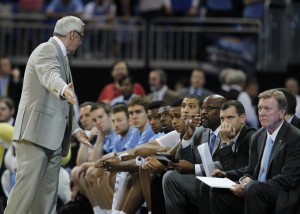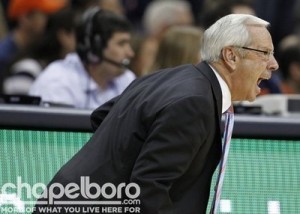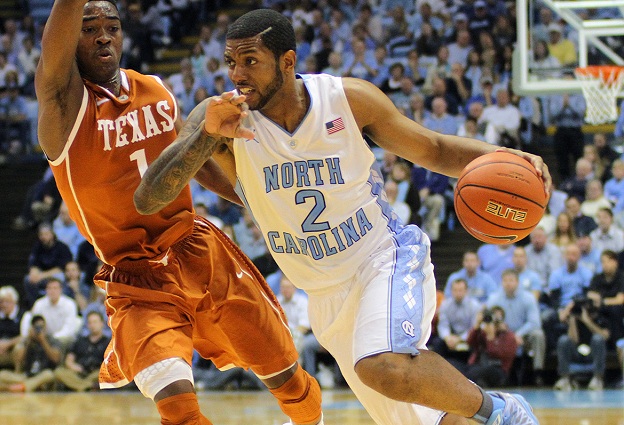Frankly, who could blame Roy Williams if he got so fed up that he quit after the season?
Fans who are quick to criticize Ol’ Roy and those inside the university who have made his job harder and his life miserable ought to think about that.
 Where would UNC be if another casualty of the three-year scandal was losing its Hall of Fame coach who is as sensitive as he is hard-nosed? He has enough problems with a 10-6 basketball team whose talent level is lower than in any other of his previous 10 seasons at Carolina, with no apparent pros on the roster.
Where would UNC be if another casualty of the three-year scandal was losing its Hall of Fame coach who is as sensitive as he is hard-nosed? He has enough problems with a 10-6 basketball team whose talent level is lower than in any other of his previous 10 seasons at Carolina, with no apparent pros on the roster.
It is conjecture, but how the P.J. Hairston story unraveled sure looks like Williams took one for the team in the decision to bounce his leading scorer for good. Both Williams and Athletic Director Bubba Cunningham had said publicly that they expected Hairston back sometime this season, but they could no longer fight the mounting evidence.
After the announcement that UNC would not apply for Hairston’s reinstatement, Roy said he could understand the various points of view. And P.J.’s family expressed displeasure with the university’s decision. Both of those reactions would support the theory that it was not merely the NCAA’s call.
A more plausible explanation is that Hairston was heading for a substantial suspension until more damning evidence came to light while the UNC Board of Governors kept pushing for a stronger stand to demonstrate it was getting tough on athletics. So it looked like a Carolina basketball player was thrown out of the program for the first time in more than 50 years.
Then, of course, came the regrettable hyperbole by UNC learning specialist Mary Willingham that one of Williams’ players could not read or write. While most Tar Heel athletes are not Rhodes Scholar candidates, one of them being completely illiterate seems patently impossible. UNC admissions director Steve Farmer said as much.
On most campuses, there is a segment of the faculty that is either over-protective of the academic mission or anti-athletics, or both. At UNC, that segment has a louder voice than at many schools playing Division I sports, perhaps because former Athletic Director Dick Baddour came from the faculty side and did not do much to control the volume.
A constant push-pull between admissions and athletics does little to underscore the fact that big-time college sports is really a self-sustaining corporation that, in UNC’s case, balances a $75 million budget without financial help from the university. In fact, athletics often sends money across the street to South Building.
In its worst iteration, such an ongoing conflict can chase coaches away. That is NOT what UNC wants to do with Williams and Larry Fedora, whose high-profile programs are seen as the front porch of the university that help fund-raising, the applicant pool and branding through national exposure to the largest subculture in America.
When Willingham and faculty members like Jay Smith, who apparently have been concerned for years, take their cases to the regional and national media instead of trying to affect change from within, the question of motive arises.
Willingham supposedly gets off on being “ranked” on several whistle-blower websites. And Smith seems to like the role as ad-hoc spokesman for the faculty, appearing on sports talk shows and as one of the first sources the media contacts. Now he says he’s writing a book.
At the heart of this matter is the small percentage of “less prepared” athletes who are mostly black male football and basketball players. All schools who want to compete at the highest level in those sports must take some of these special admits.
And it seems logical they would be drawn to African-American history, like Jewish students take courses at the Center for Jewish Studies, musicians major in music, burgeoning actors take drama classes. It is their heritage, so why not study it?
What is wrong with admitting these kids, most of whom are being given the chance of a lifetime and come from communities that help them become great athletes but do not prepare them for college? Where would they go if they never received college scholarships? Probably nowhere.
There are likely as many 4.0 students who don’t graduate as these less-prepared kids who might have undiscovered learning disabilities or who just test poorly. With the proper help, they can improve their lives dramatically by getting athletic scholarships. A few will become pro athletes, but others will benefit from the socialization they receive on campus and make alumni contacts that could lead to good jobs when they get out of school. Some may even go back to their communities and help the next generation of kids get better prepared for college.
Isn’t that a mission of a state university?
So what do we have here? Some academic procedures and principles that were violated and have since been corrected. And a continuing controversy that the national press has jumped all over to report on issues they really know very little about. Mostly, a prevailing feeling that the story will never end and keep hurting our reputation and attempts to move beyond it.

Photo by Todd Melet
About this time in Roy Williams’ 15-year tenure at Kansas, he had some problems with an administration that had turned over. It led him to break his pledge to remain at KU and eventually come back to UNC, where he has had even more success as a coach than he did in Lawrence.
At 63, he is unlikely to go to another school or an NBA team. But with grandchildren he adores, more money saved up than he could ever spend and on-again, off-again health issues, Williams could reach the point where he feels under-appreciated and decides to walk away.
A long shot, probably, but a scenario worth thinking about for some people who are letting ego, grandstanding or their prejudices toward athletics and athletes dictate some destructive actions.





Comments on Chapelboro are moderated according to our Community Guidelines